Founding
The Special Collections department was founded in June 1967 within the university library then known as Nevada Southern University (NSU).
Collecting Material on the History of Southern Nevada
Special Collections is the first and central repository for material documenting the history of Southern Nevada. Although the Nevada Historical Society in Reno and Special Collections at the University of Nevada, Reno had long collected material on northern Nevada history, there had been no equivalent repository in southern Nevada until the opening of the Special Collections section of the NSU Library.
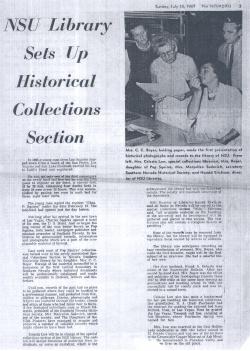
Prior to its founding, the Southern Nevada Historical Society (now defunct) and the Daughters of Utah Pioneers had been the only organizations that worked to acquire and preserve historical documents and photographs in the southern half of the state. An NSU Library report from 1966/67 noted that the Southern Nevada Historical Society had designated the library as the depository for its collections.
An article in The Nevadan, dated July 16, 1967, reported on the department’s founding and highlighted its regional collecting focus. In the article, Hal Erickson (then Director of NSU Libraries) noted that all books on Nevada were to be moved to this section and that “all available material on the founding of the university and its development will be gathered and placed in this section.” The new division was also slated to contain what Erickson termed “a complete history of gambling.”
Pioneers of Special Collections
Three individuals were primarily responsible for the development of the collection in its early years:
- Celesta Lowe
- Hal Erickson
- Anna Dean Kepper
In addition, Stephen Powell, who created the first published bibliography of the department’s gaming collection, and later Susan (Anderl) Jarvis were largely responsible for the initial development and growth of what would later become the Center for Gaming Research.
Celesta Lowe
Long-time Nevadan Celesta Lowe took care of the day-to-day business of Special Collections in its early years and much of its initial organization. As a member of a pioneering southern Nevada family herself (one grandfather graded the Las Vegas - Tonopah rail line and her father later mined in El Dorado Canyon), Lowe’s knowledge of the area and its early community members enabled her to attract many initial donations to the repository.
Lowe also had the distinction of being one of the first employees of UNLV, acting as secretary to Dr. James R. Dickinson, namesake of the first UNLV Library building. She was one of the first library employees as well, ordering, unpacking, and organizing the very first books to arrive at the fledgling university library prior to the construction of the first campus building, Frazier Hall.
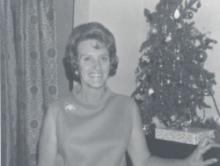
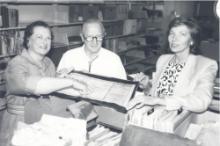
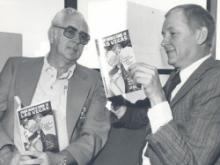
Hal Erickson
Hal Erickson, the second Director of Libraries at NSU (UNLV), was an enthusiastic supporter of Special Collections from its conception. Upon his arrival at the university library in 1965, Erickson immediately realized the possibilities of a regional history collection. At the time, researchers often needed to travel to California for Nevada materials, as there were few local collections except those held in northern Nevada.
His outreach in the community resulted in a number of significant donations that added depth to the manuscript, gaming, and menu collections over the years. Erickson was particularly interested in building up the culinary collections in support of UNLV’s College of Hotel Administration.
Anna Dean Kepper
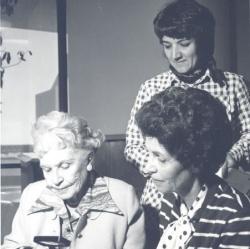
Kepper arrived in 1974 and initially worked as a library assistant in the department; by 1976, with dual degrees in museology and American folk culture, she was appointed curator of Special Collections.
During her tenure in Special Collections, Kepper worked diligently with the local community to create an awareness of the department’s efforts to preserve historical documents and photographs.
Her zeal was such that she was known for the “missionaries” that she sent out into the community to be an extension of her eyes and ears in obtaining collections.
Kepper was particularly proud of securing numerous important photograph collections that provide invaluable visual documentation of the Las Vegas landscape back in its early days. Kepper, also known for her devotion to historic preservation causes in Las Vegas, died of cancer in 1983, shortly after obtaining her Master’s Degree in public administration.
Her work in documenting the history of Southern Nevada was considered so significant that she was recognized by the Las Vegas Review Journal in their 1999 book The First 100: Portraits of the Men and Women Who Shaped Las Vegas.
Today's Special Collections
From these initial donations from pioneer Las Vegans, many of whom were present at the city’s founding in 1905, to additions from persons active in developing Las Vegas into the casino resort and entertainment destination it became in the 1950s, and still others from those instrumental in aiding its growth into a community, UNLV Special Collections has evolved over the past fifty years into the richest and most complete source of documentation on the history, culture, and landscape of Las Vegas and its environs in southern Nevada.
In addition, its collection of gaming-related research material is the largest in the world. Finally, documents and photographs on the history of UNLV from its origins as Nevada Southern University and transformation into the dynamic university it is today also form an important part of the department and have provided much of the photographic context for UNLV’s 50th anniversary celebration.
Today its expansive gaming collection forms part of the Center for Gaming Research; initiatives to gather, process, and preserve women’s history in Nevada resulted in the creation of the Nevada Women’s Archives in 1994; documentation on the history of music and entertainment on the Las Vegas Strip can be found in the archives of the Arnold Shaw Popular Music Research Center within the department; and past and present efforts to collect the oral history of notable Southern Nevadans led to the creation of the Oral History Research Center in 2003. All of these collecting initiatives function as part of UNLV Special Collections.
We encourage you to visit our department in person and online if you are interested in obtaining more information about this fascinating city and region that we live in, and if you are interested in making a donation of materials that will aid us in continuing to preserve and make available the legacy of fabulous Las Vegas.

